
The European Union (EU) is a supranational political and economic union of 27 member states that are located primarily in Europe. The Union has a total area of 4,233,255 km2 (1,634,469 sq mi) and an estimated total population of over 449 million. The EU has often been described as a sui generis political entity combining the characteristics of both a federation and a confederation.
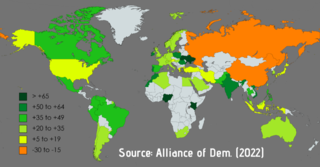
Euroscepticism, also spelled as Euroskepticism or EU-scepticism, is a political position involving criticism of the European Union (EU) and European integration. It ranges from those who oppose some EU institutions and policies, and seek reform, to those who oppose EU membership and see the EU as unreformable. The opposite of Euroscepticism is known as pro-Europeanism, or European Unionism.
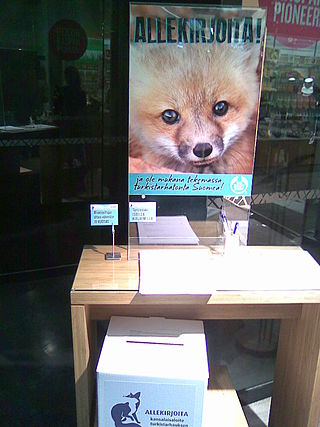
A popular initiative is a form of direct democracy by which a petition meeting certain hurdles can force a legal procedure on a proposition. The hurdles the petition has to meet vary between countries, typically signatures by a certain number of registered voters.

Pro-Europeanism, sometimes called European Unionism, is a political position that favours European integration and membership of the European Union (EU).

Multi-speed Europe or two-speed Europe is the idea that different parts of the European Union should integrate at different levels and pace depending on the political situation in each individual country. Indeed, multi-speed Europe is currently a reality, with only a subset of EU countries being members of the eurozone and of the Schengen area. Like other forms of differentiatedintegration such as à la carte and variable geometry, "multi-speed Europe" arguably aims to salvage the "widening and deepening of the European Union" in the face of political opposition.

European Union citizenship is afforded to all nationals of member states of the European Union (EU). It was formally created with the adoption of the 1992 Maastricht Treaty, at the same time as the creation of the EU. EU citizenship is additional to, as it does not replace, national citizenship. It affords EU citizens with rights, freedoms and legal protections available under EU law.
European nationalism is a form of pan-nationalism based on a pan-European identity. It is considered minor since the National Party of Europe disintegrated in the 1970s.

The question of whether the governance of the European Union (EU) lacks democratic legitimacy has been debated since the time of the European Economic Community in the late 1970s. This led in part to an elected European Parliament being created in 1979 and given the power to approve or reject EU legislation. Since then, usage of the term has broadened to describe newer issues facing the European Union. Voter turnout at the elections to the European Parliament fell consecutively at every election from the first in 1979 up to 2014 when it hit a low of 42.54%, before finally rising in 2019. The 2014 turnout figure is lower than that of any national election in the 27 countries of the European Union, where turnout at national elections averages 68% across the EU.
The seven institutions of the European Union (EU) are seated in four different cities, which are Brussels (Belgium), Frankfurt am Main (Germany), Luxembourg (Luxembourg) and Strasbourg (France), rather than being concentrated in a single capital city. All four were chosen, among various reasons, for their location halfway between France and Germany, the countries whose rivalry led to two World Wars and whose reconciliation paved the way for European integration. The EU agencies and other bodies are located all across the union, but usually not fixed in the treaties. The Hague is the only exception, as the fixed seat of the Agency for Law Enforcement Cooperation (Europol). Luxembourg City is the EU capital that can lay claim to having the most of the seven EU institutions based wholly or partly upon its territory, with only the European Council and European Central Bank not having a presence in the city. Over the years, Brussels has become the EU's political hub, with the College of the Commissioners – the European Commission's politically accountable executive – and the European Council both meeting at their Brussels-based headquarters, and the European Parliament and Council of the EU holding the majority of their meetings annually within the city. This has led media to describe it as the de facto "capital of the EU".

A federal Europe, also referred to as the United States of Europe (USE), European State, or a European federation, is a hypothetical scenario of European integration leading to the formation of a sovereign superstate, organised as a federation of the member countries of the European Union (EU), as contemplated by political scientists, politicians, geographers, historians, futurologists and fiction writers. At present, while the EU is not a federation, various academic observers regard it as having some of the characteristics of a federal system.
The European Alliance for Freedom (EAF) was a pan-European political party of right-wing Eurosceptics. It was founded in late 2010, the party was recognised by the European Parliament in 2011. It did not seek registration as a political party with the new Authority for European Political Parties and European Political Foundations in 2016 and was dissolved in the following.
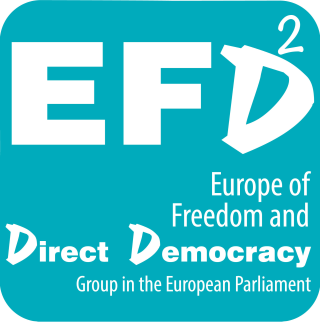
Europe of Freedom and Direct Democracy was a Eurosceptic and populist political group in the European Parliament. The EFDD group was a continuation for the Eighth European Parliament of the Europe of Freedom and Democracy (EFD) group that existed during the Seventh European Parliament, with significant changes to group membership.
Right2Water is a campaign to commit the European Union and member states to implement the human right to water and sanitation.

Direct Democracy for Europe is a campaign group formed by six former organizers of the German anti-Islam Pegida protests, led by the former Pegida treasurer, Kathrin Oertel. DDfE split from Pegida after Pegida's founder, Lutz Bachmann—who had resigned as chairman in late January 2015 after allegations of hate speech and revelations that he had posed as Adolf Hitler for selfies—refused to leave Pegida's 12-person organizing team. Oertel, a freelance business consultant from Coswig, Saxony, near Dresden, was previously the second most prominent spokesperson of Pegida.
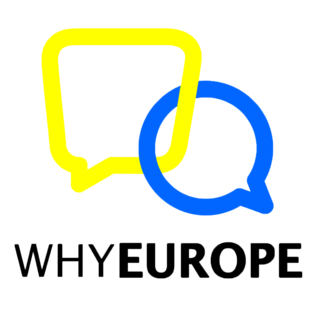
WhyEurope is a non-partisan and independent non-profit organization, which was founded in 2016 in Freiburg im Breisgau, Germany. Since September 2017, WhyEurope is an officially registered association based in Tübingen, Germany. It has approximately 30 members from over 10 European states.

Damian Hieronymus Johannes Freiherr von Boeselager is a German business consultant, journalist and politician of Volt Europa. He is member of European Parliament in The Greens/EFA Group since his election in 2019.
Projects of Common Interest (PCIs) is a category of projects launched in 2013, which the European Commission has identified as a key priority to interconnect the energy infrastructure in the European Union. These projects are eligible to receive public funds. The PCI list is reviewed every two years. Since 2014, it is synoymously used with the term "Important Project of Common European Interest" (IPCEI) and includes innovation in microelectronics and communication technologies.
The Conference on the Future of Europe was a proposal of the European Commission and the European Parliament, announced at the end of 2019, with the aim of looking at the medium- to long-term future of the EU and what reforms should be made to its policies and institutions. It is intended that the Conference should involve citizens, including a significant role for young people, civil society, and European institutions as equal partners and last for two years. It will be jointly organised by the European Parliament, the EU Council and the European Commission. On 19 April 2021, the multilingual digital platform of the Conference futureu.europa.eu was launched.
Participatory democracy "is founded on the direct action of citizens who exercise some power and decide issues affecting their lives". Participatory democracy refers to mechanisms through which citizens are involved in public decision-making processes, not as an alternative to representative democracy but as a complement to it.
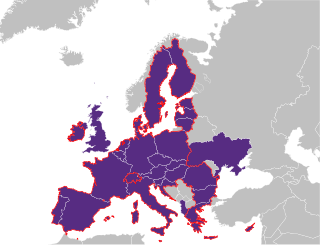
Volt Germany is a social-liberal pro-European, eurofederalist political party in Germany. It is the German branch of Volt Europa, a political movement that operates on a European level.











